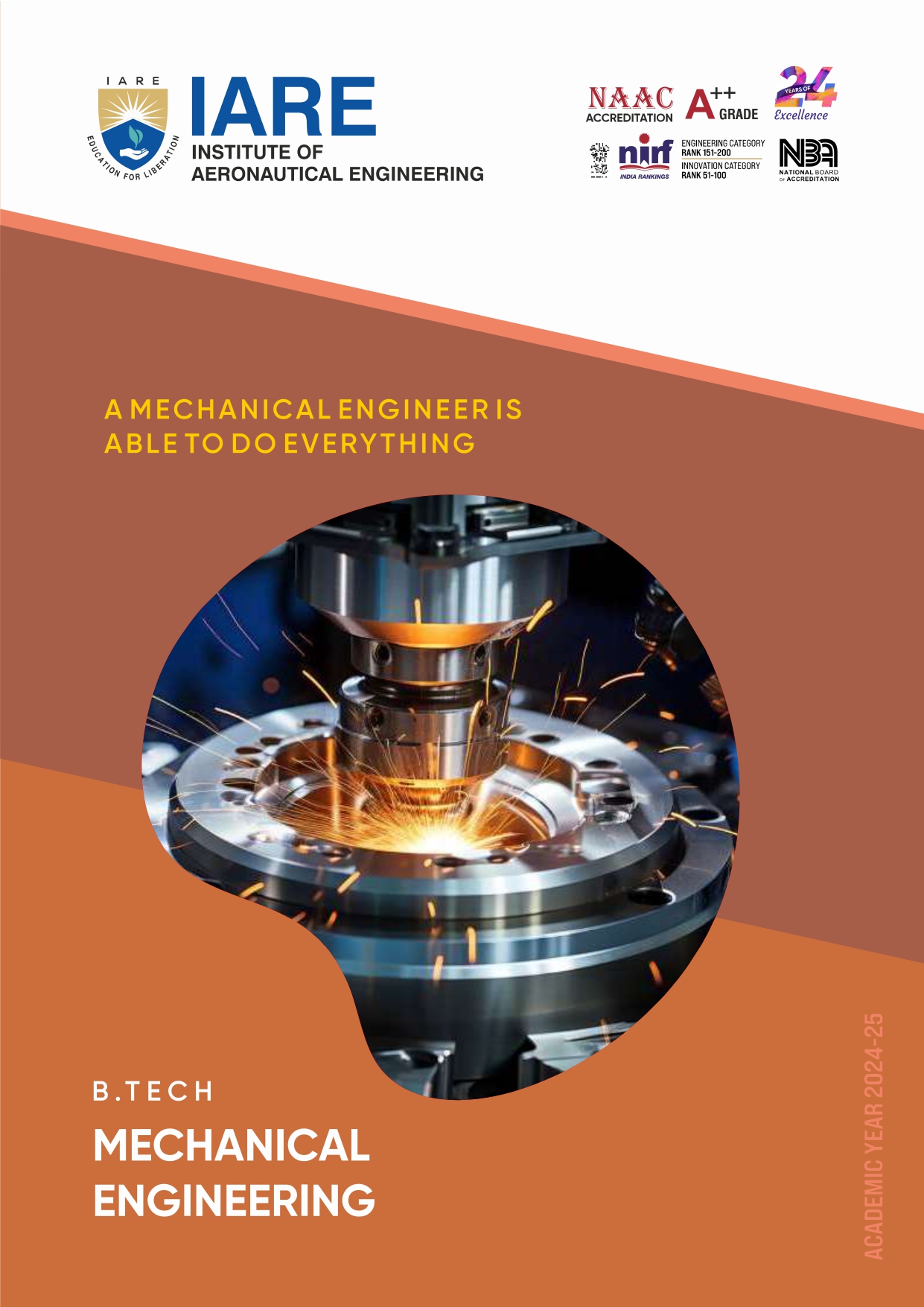Massive Open Online Courses (MOOCs) - M.Tech
It is one of the most amazing innovations in online learning over the past few years has been the growth and development of Massive Open Online Courses, better known as MOOCs. These courses (MOOCs) are the future of Quality Enhancement in Engineering Education (QEEE) and improve self-learning.
Generally speaking, MOOCs are college-level courses made available, free of charge or with nominal charges. At IARE, MOOCs are often offered from highly prestigious colleges and universities like Harvard, Stanford and, most predominantly, MIT, and taught by the same professors and instructors that teach them on their famous campuses and by a variety of private providers.
The students admitted under Autonomous status in M.Tech I Semester are required to complete one MOOC course by the end of the semester. Below you will find the course titles and links to some of the most popular MOOCs offered for M.Tech (CAD/CAM) I semester during academic year 2016 - 2017:
Course Details
|
|
| MOOC procedure |
Coursera |
| Conducting Institute |
Georgia Institute of Technology |
| Instructor |
Dr. Wayne Whiteman |
| Starting Date / Duration |
7 Weeks/ 14th November, 2017 |
| Website |
https://www.coursera.org/learn/engineering-mechanics-statics-2 |
| Course Description |
This course applies principles learned in my course “Introduction to Engineering Mechanics” to analyze real world engineering structures. You will need to have mastered the engineering fundamentals from that class in order to be successful in this course offering. This course addresses the modeling and analysis of static equilibrium problems with an emphasis on real world engineering systems and problem solving. |
|
|
|
| MOOC procedure |
edX |
| Conducting Institute |
ETH Zurich |
| Instructor |
Roland Siegwart, Marco Hutter, Margarita Chli, Davide Scaramuzza, Martin Rufli |
| Starting Date /Duration |
75 hours / Self paced |
| Website |
https://www.edx.org/course/autonomous-mobile-robots-ethx-amrx-1 |
| Course Description |
Robots are rapidly evolving from factory workhorses, which are physically bound to their work-cells, to increasingly complex machines capable of performing challenging tasks in our daily environment. The objective of this course is to provide the basic concepts and algorithms required to develop mobile robots that act autonomously in complex environments. The main emphasis is put on mobile robot locomotion and kinematics, environment perception, probabilistic map based localization and mapping, and motion planning. The lectures and exercises of this course introduce several types of robots such as wheeled robots, legged robots and drones. This course closely follows the textbook Introduction to Autonomous Mobile Robots by Roland Siegwart, Illah Nourbakhsh, Davide Scaramuzza, The MIT Press, second edition 2011. |
|
|
|
|
MOOC procedure
|
WIPO Academy
|
|
Conducting Institute
|
WIPO, United Nations Organization
|
|
Instructor
|
WIPO specialists
|
|
Starting Date / Duration
|
8 Weeks/30, November, 2016
|
|
Website
|
http://www.wipo.int/academy/en/courses/distance_learning/
|
|
Course Description
|
The course was developed by WIPO specialists on the Patent Cooperation Treaty (PCT), using the pedagogical and distance learning methodology of the WIPO Academy. Self-assessment tools are strategically placed throughout the course to measure your understanding and progress. In addition to the course material, links to specific reference documents are provided, such as legal texts and other official WIPO documents. The content and methodology of all “General Primer” courses are structured to complement self-directed learning. As such, participants are able to review course material at their own pace.
|
|
|
|
| MOOC procedure |
Coursera |
| Conducting Institute |
University of California, Davis USA |
| Instructor |
Dr. James F. Shackelford |
| Starting Date / Duration |
7 Weeks/7th November, 2016. |
| Website |
https://www.coursera.org/learn/materials-science |
| Course Description |
We explore “10 things” that range from the menu of materials available to engineers in their profession to the many mechanical and electrical properties of materials important to their use in various engineering fields. We also discuss the principles behind the manufacturing of those materials. |
|
|
|
| MOOC procedure |
Future learn |
| Conducting Institute |
University of New South Wales |
| Instructor |
Gangadhara Prusty and Robin Ford |
| Starting Date / Duration |
7 Weeks/25 November, 2016 |
| Website |
https://www.futurelearn.com/courses/through-engineers-eyes |
| Course Description |
When you design anything, how do you know that the design will work? You need Engineering Mechanics - the science-based analysis that engineers use to predict how their designs will perform, so they can meet their responsibilities for performance and safety. It starts with physics - forces, equilibrium, acceleration, gravity - but then engineers adapt it to their own purposes. In this free online course, you will learn analytical skills, use them to understand experiments, and apply them in design. You will be living in the engineer’s world. |
|








 Work with Us
Work with Us Campus Map
Campus Map How to Reach Us
How to Reach Us Online Degree Verification
Online Degree Verification Photo Gallery
Photo Gallery